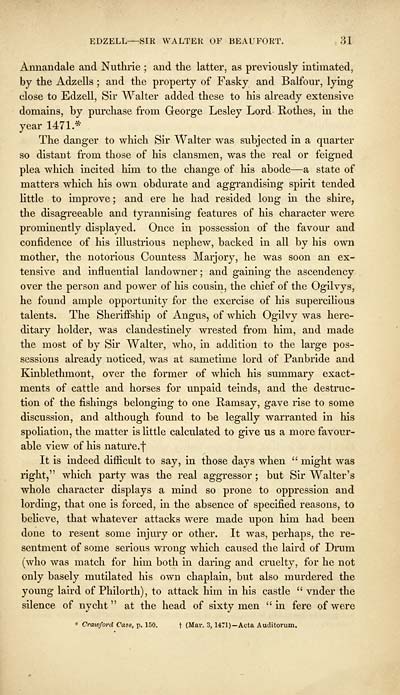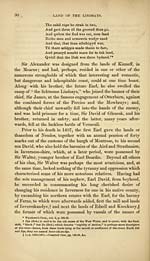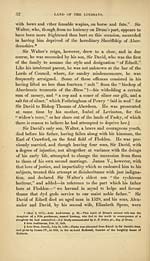Download files
Complete book:
Individual page:
Thumbnail gallery: Grid view | List view

EDZELL — SIR WALTER OF BEAUFORT. , 31
Annandale and Nuthrie ; and the latter, as previously intimated,
by the Adzells ; and the property of Fasky and Balfour, lying
close to Edzell, Sir Walter added these to his already extensive
domains, by purchase from George Lesley Lord Rothes, in the
year 1471 *
The danger to which Sir Walter was subjected in a quarter
so distant from those of his clansmen, was the real or feigned
plea which incited him to the change of his abode — a state of
matters which his own obdurate and aggrandising spirit tended
little to improve ; and ere he had resided long in the shire,
the disagreeable and tyrannising features of his character were
prominently displayed. Once in possession of the favour and
confidence of his illustrious nephew, backed in all by his own
mother, the notorious Countess Marjory, he was soon an ex-
tensive and influential landowner ; and gaining the ascendency
over the person and power of his cousin, the chief of the Ogilvys,
he found ample opportunity for the exercise of his supercilious
talents. The Sheriffship of Angus, of which Ogilvy was here-
ditary holder, was clandestinely wrested from him, and made
the most of by Sir Walter, who, in addition to the large pos-
sessions already noticed, was at sametime lord of Panbride and
Kinblethmont, over the former of which his summary exact-
ments of cattle and horses for unpaid teinds, and the destruc-
tion of the fishings belonging to one Ranisay, gave rise to some
discussion, and although found to be legally warranted in his
spoliation, the matter is little calculated to give us a more favour-
able view of his nature.f
It is indeed difficult to say, in those days when " might was
right," which party was the real aggressor ; but Sir Walter's
whole character displays a mind so prone to oppression and
lording, that one is forced, in the absence of specified reasons, to
believe, that whatever attacks were made upon him had been
done to resent some injury or other. It was, perhaps, the re-
sentment of some serious wrong which caused the laird of Drum
(who was match for him both in daring and cruelty, for he not
only basely mutilated his own chaplain, but also murdered the
young laird of Philorth), to attack him in his castle " vnder the
silence of nycht " at the head of sixty men "in fere of were
« Crawford Case, p. 150. t (Mar. 3, 1471)— Acta Auditorum.
Annandale and Nuthrie ; and the latter, as previously intimated,
by the Adzells ; and the property of Fasky and Balfour, lying
close to Edzell, Sir Walter added these to his already extensive
domains, by purchase from George Lesley Lord Rothes, in the
year 1471 *
The danger to which Sir Walter was subjected in a quarter
so distant from those of his clansmen, was the real or feigned
plea which incited him to the change of his abode — a state of
matters which his own obdurate and aggrandising spirit tended
little to improve ; and ere he had resided long in the shire,
the disagreeable and tyrannising features of his character were
prominently displayed. Once in possession of the favour and
confidence of his illustrious nephew, backed in all by his own
mother, the notorious Countess Marjory, he was soon an ex-
tensive and influential landowner ; and gaining the ascendency
over the person and power of his cousin, the chief of the Ogilvys,
he found ample opportunity for the exercise of his supercilious
talents. The Sheriffship of Angus, of which Ogilvy was here-
ditary holder, was clandestinely wrested from him, and made
the most of by Sir Walter, who, in addition to the large pos-
sessions already noticed, was at sametime lord of Panbride and
Kinblethmont, over the former of which his summary exact-
ments of cattle and horses for unpaid teinds, and the destruc-
tion of the fishings belonging to one Ranisay, gave rise to some
discussion, and although found to be legally warranted in his
spoliation, the matter is little calculated to give us a more favour-
able view of his nature.f
It is indeed difficult to say, in those days when " might was
right," which party was the real aggressor ; but Sir Walter's
whole character displays a mind so prone to oppression and
lording, that one is forced, in the absence of specified reasons, to
believe, that whatever attacks were made upon him had been
done to resent some injury or other. It was, perhaps, the re-
sentment of some serious wrong which caused the laird of Drum
(who was match for him both in daring and cruelty, for he not
only basely mutilated his own chaplain, but also murdered the
young laird of Philorth), to attack him in his castle " vnder the
silence of nycht " at the head of sixty men "in fere of were
« Crawford Case, p. 150. t (Mar. 3, 1471)— Acta Auditorum.
Set display mode to:
![]() Universal Viewer |
Universal Viewer | ![]() Mirador |
Large image | Transcription
Mirador |
Large image | Transcription
Images and transcriptions on this page, including medium image downloads, may be used under the Creative Commons Attribution 4.0 International Licence unless otherwise stated. ![]()
| Histories of Scottish families > History and traditions of the land of the Lindsays in Angus and Mearns > (49) Page 31 |
|---|
| Permanent URL | https://digital.nls.uk/94869614 |
|---|
| Description | A selection of almost 400 printed items relating to the history of Scottish families, mostly dating from the 19th and early 20th centuries. Includes memoirs, genealogies and clan histories, with a few produced by emigrant families. The earliest family history goes back to AD 916. |
|---|

